Magnus Carlsen vs FIDE
The chess world is witnessing an unprecedented clash between Magnus Carlsen VS FIDE, the International Chess Federation, over the emergence of Freestyle Chess. This controversy, now being dubbed the FIDE and Freestyle Chess Conflict, revolves around Magnus Carlsen’s latest venture: a high-stakes, multi-million-dollar chess tour that aims to crown an independent world champion. The battle for chess supremacy has sparked debates on governance, player rights, and the future of competitive chess.
Table of Contents
What is Freestyle Chess?
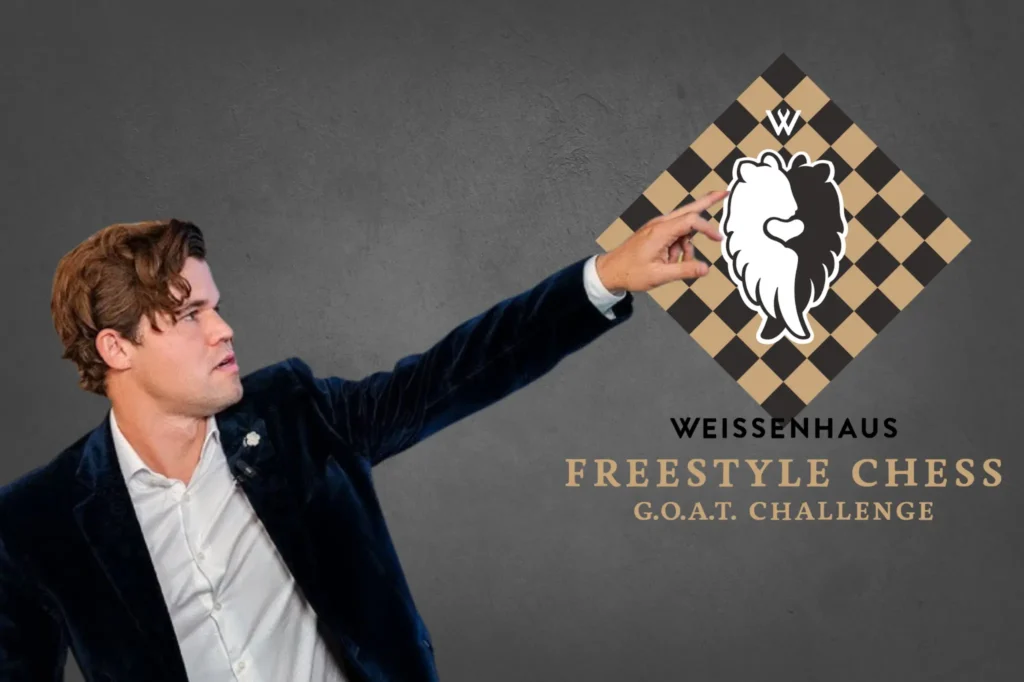
Freestyle Chess Tour, also known as Fischer Random Chess or Chess960, is a variant where the back-rank pieces are randomly shuffled before each game. This format reduces the reliance on opening theory and encourages pure creativity and strategic improvisation. Magnus Carlsen, along with businessman Jan Henrik Buettner, has launched the Freestyle Chess Grand Slam Tour, a five-event series boasting a $12 million prize pool. This ambitious project is designed to revolutionize chess by offering an alternative to the traditional FIDE-organized events.
The Origins of the Magnus vs FIDE Conflict
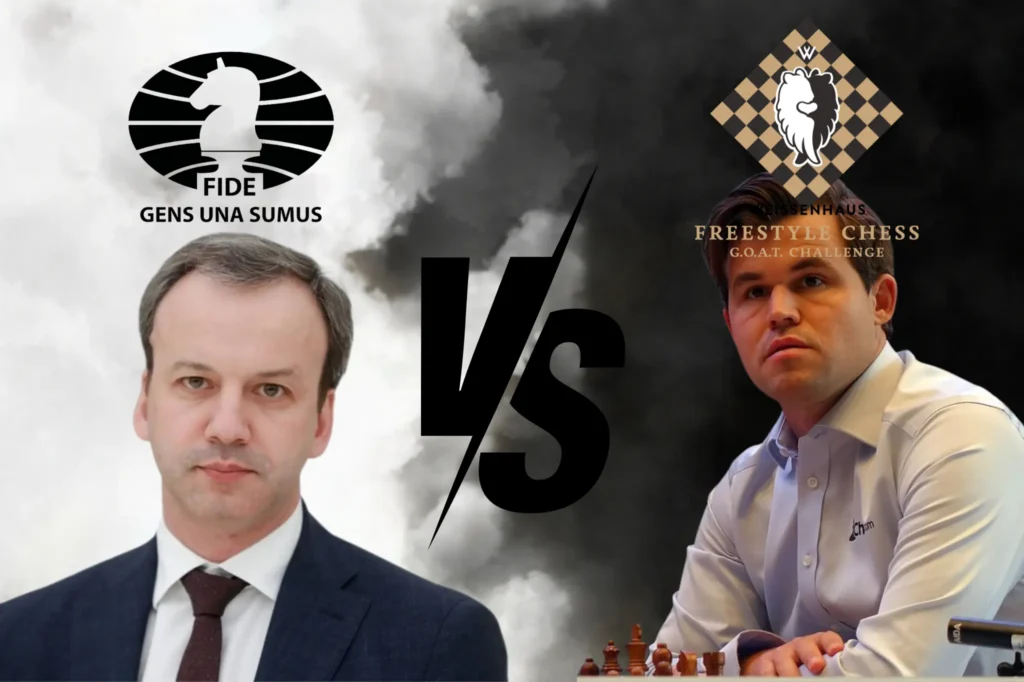
Tensions between FIDE and Magnus Carlsen have been brewing for years. Carlsen, a five-time classical world chess champion, has been openly critical of FIDE’s management and its handling of championship events. His dissatisfaction reached a boiling point when FIDE introduced restrictive rules that prevent players from competing in alternative world championship events.
The controversy escalated when FIDE issued a statement on January 21, 2025, asserting that:
- FIDE is the sole governing body of chess recognized by the International Olympic Committee.
- Any player participating in an “unauthorized” world championship event could face exclusion from official FIDE events, including the Candidates Tournament and World Championship cycle.
- Freestyle Chess is not sanctioned as an independent world championship under FIDE’s jurisdiction.
Carlsen and the Freestyle Chess Players Club (FCPC) challenged this decision, arguing that FIDE does not have the legal right to monopolize chess formats. This led to heated negotiations, but no resolution was reached.
Magnus Carlsen Calls for FIDE President’s Resignation(fide and magnus conflict):
On February 3, 2025, Magnus Carlsen shocked the chess community by posting a scathing tweet that questioned the leadership of FIDE President Arkady Dvorkovich. Carlsen’s message implied that Dvorkovich should resign if he continues to block the Freestyle Chess initiative.
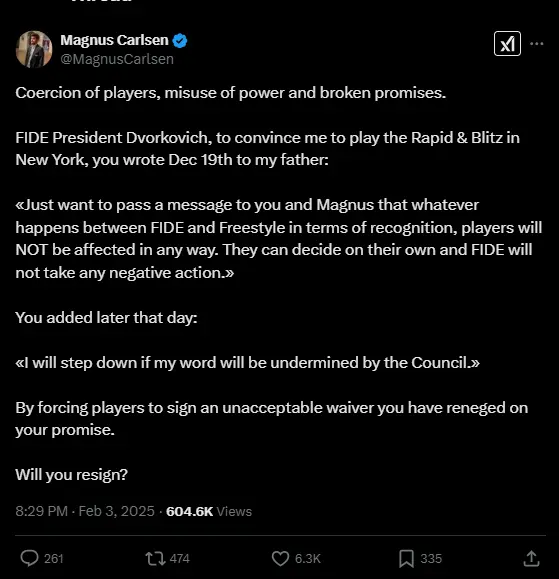
This public challenge marked a historic moment in chess history, drawing parallels to Garry Kasparov’s split from FIDE in 1993, when he created the Professional Chess Association (PCA) in protest against FIDE’s inefficiency. Kasparov’s move led to a divided chess world for over a decade, and many fear that Carlsen’s standoff with FIDE could trigger a similar fragmentation.
FIDE’s Response and the Legal Battle Ahead:(fide and freestyle chess conflict)
FIDE’s top executives, including CEO Emil Sutovsky, defended their stance, arguing that allowing a privately-run chess tour to crown a world champion would undermine FIDE’s authority. Sutovsky stated:
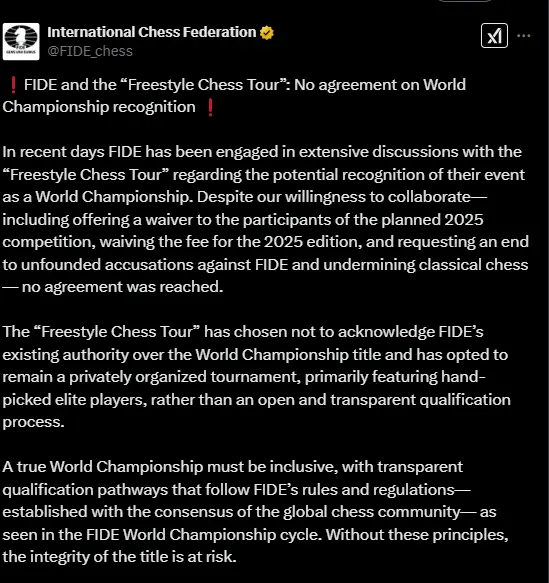
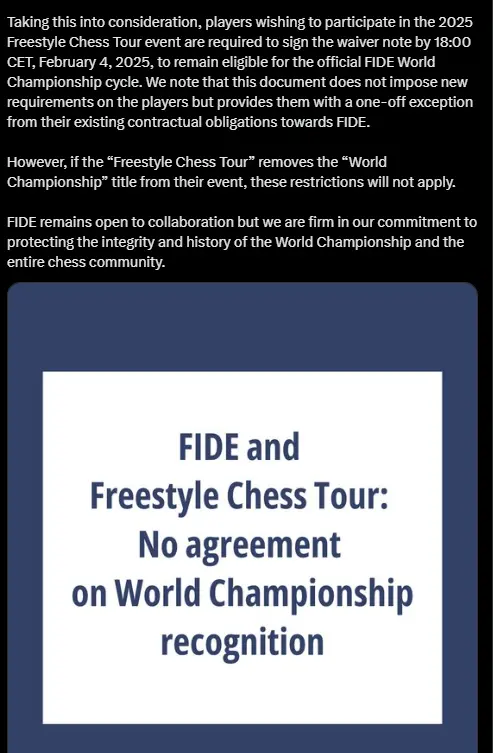
“FIDE has the duty to protect the integrity of chess. We will not accept private organizations running world championship cycles without our approval.”
Despite this, the Freestyle Chess movement has gained momentum, with growing support from top grandmasters and investors. The core argument of Freestyle Chess advocates is that FIDE’s monopoly stifles innovation and restricts player freedom. Meanwhile, FIDE counters that allowing parallel world championships could destabilize the structure of competitive chess.
Financial and Commercial Implications
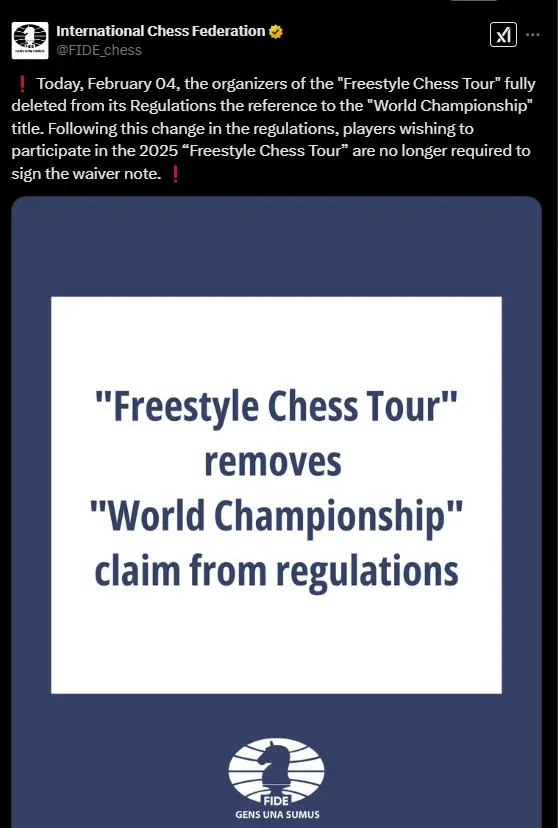
The conflict between FIDE and Freestyle Chess is not just about governance; it also has major financial implications. Unlike traditional sports organizations such as FIFA or the UFC, FIDE has struggled to secure consistent corporate sponsorships. Chess lacks major TV broadcasting deals and relies primarily on online platforms and niche sponsorships.
The Freestyle Chess Grand Slam Tour, backed by significant private investment, presents a direct challenge to FIDE’s financial model. With its Formula 1-style global tournament circuit, high prize funds, and professional branding, it could attract the world’s top players away from FIDE events. This could create a split where players are forced to choose between competing in FIDE tournaments or Freestyle Chess events.
What Happens Next?(Magnus carlsen resigns from fide?)
With no resolution in sight, the chess world is at a crossroads. Some potential outcomes include:
- FIDE and Freestyle Chess reach a compromise, allowing both to coexist with shared recognition.
- Freestyle Chess tour becomes a fully independent entity, leading to a fragmented competitive chess scene similar to what happened with Kasparov’s PCA vs. FIDE in the 1990s.
- Legal battles ensue, determining whether FIDE’s exclusivity clauses are legally enforceable.
- Players take sides, with some grandmasters aligning with FIDE while others join Magnus Carlsen’s Freestyle Chess tour.
- Sponsorship and public support dictate the future, with corporate backing potentially shifting towards the Freestyle Chess model.
Conclusion: A Defining Moment for Chess
The ongoing Magnus Carlsen vs FIDE battle is more than just a political dispute—it represents a potential paradigm shift in professional chess. Whether Freestyle Chess Tour succeeds in breaking FIDE’s monopoly or not, this controversy has sparked global conversations about the governance, commercialization, and evolution of chess.
As the situation develops, chess enthusiasts worldwide will be watching closely to see whether Magnus Carlsen’s bold gamble pays off or if FIDE manages to maintain its dominance over the world of competitive chess. One thing is certain: the chess world will never be the same again.
FAQ: Magnus Carlsen vs. FIDE and the Rise of Freestyle Chess
1. What is the conflict between Magnus Carlsen and FIDE?
The conflict stems from Magnus Carlsen’s dissatisfaction with FIDE’s championship format and governance. Carlsen has been vocal about his desire for innovation in chess, which clashes with FIDE’s traditional approach.
2. What is Freestyle Chess?
Freestyle Chess is a new format that allows players to use AI assistance, alternative time controls, and creative rule modifications to enhance the game. It aims to push the boundaries of conventional chess and provide a fresh competitive experience.
3. Why is FIDE opposed to Freestyle Chess?
FIDE sees Freestyle Chess as a deviation from traditional chess rules and a potential challenge to its authority in organizing world championships. There are concerns about maintaining the integrity and history of classical chess.
4. Is Magnus Carlsen supporting Freestyle Chess?
While Carlsen has not officially endorsed Freestyle Chess, he has shown interest in alternative formats and has been critical of FIDE’s rigid structure. His willingness to explore new competitive avenues has fueled speculation about his potential involvement.
5. How does this impact the future of chess championships?
The ongoing debate could lead to significant changes in how chess is played at the highest level. Whether FIDE adapts or alternative chess leagues gain popularity remains to be seen, but innovation in chess appears inevitable.

















